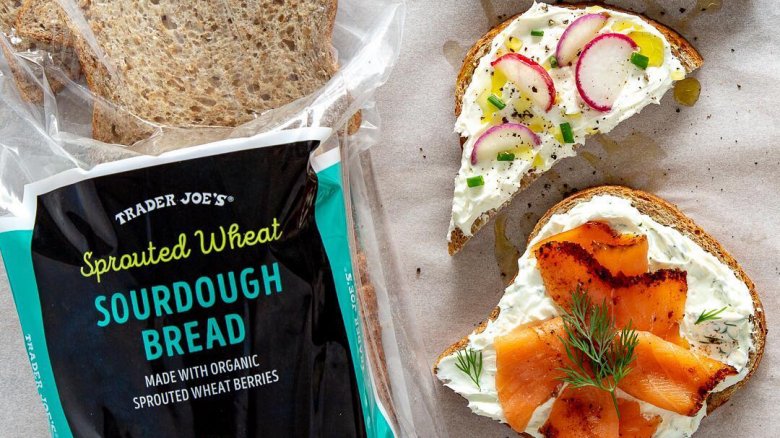The Real Reason Trader Joe's Bread Goes Bad So Fast
There's a lot to love about Trader Joe's. The ridiculously cheap Two Buck Chuck, the vast array of cheeses at price points that can't be beat, the impressive frozen offerings that a busy host could totally pass off as their own creation to unsuspecting dinner guests... that doesn't even scratch the surface of all the good reasons to shop at TJ's. Really, it would take a lot less time to list the things we don't love about Trader Joe's, because that list consists of two items: Products that pull a disappearing act the second you fall in love with them, and the bakery products that seem to spoil minutes after you leave the store. We're here to talk about the bread.
It's not your imagination. Trader Joe's bread goes bad fast. It doesn't matter if you store it on the counter or in the refrigerator, or even what kind of bread you buy — whether it's sprouted multi-grain, sourdough, bagels, lavash, or tortillas — in what seems like no time at all, you see the first signs of mold.
Take this accurate depiction, for instance:
me: hi
trader joe's bread: pic.twitter.com/EFD6yT0D7o— Sam Chapman (@siouxsie_orman) February 5, 2019
Threads on Quora, Reddit, and even NeoGAF are dedicated to the subject. A Yelp review reads, "Every time I buy bread or pita at Trader Joe's, it goes moldy in about 2 days — way before its expiration date." This is clearly not a one-off issue. So what gives?
According to the Trader Joe's website, all signs point to what's not in their bread. See, TJ's makes a promise to its customers when it comes to any of the foods sold under the Trader Joe's private label, and part of that promise is that none of those products will contain artificial preservatives. None. Zero. (They also won't have artificial flavors, colors, MSG, GMOs, or partially hydrogenated oils.)
Trader Joe's explains their position on artificial preservatives like this: "Preservatives are used in food to prevent spoilage and to maintain nutritional value, appearance and/or flavor for a longer period. Artificial preservatives are synthetically produced chemical substances, like disodium ethylene diamine tetraacetic acid or butylated hydroxyanisole. Our theory is, if it is tough to get out of the mouth, don't put it in the mouth. For preservation purposes, we choose to use substances from natural sources like sugar, salt, vinegar, celery juice and/or rosemary extract..."
But celery juice and vinegar, effective as they may be as a natural preservative, are less effective than the artificial ingredients they replace, and that lack of artificial preservatives means that you can't expect your Trader Joe's sprouted wheat sourdough to last as long as a loaf of preservative-laden cheap white bread that's somehow already been sitting on the dollar store shelf for a week. And while TJ's promises "great quality fare for exceptional, everyday prices," they obviously can't promise that preservative-free bread will have a lengthy shelf life.
Short of buying that dollar store bread that miraculously lasts three weeks in the cabinet without a speck of mold, is there anything you can do to extend the shelf life of your Trader Joe's bread? One Redditor who says they work as a TJ's manager had a piece of advice for another user who wanted to know why the expiration dates on the store's bread seem to be nearly immediate: "...you can be that guy that I hate but understand and also shop like, and reach in the back to try and find a later date. The bread shelves should pop out if you push them in, go diggin'!" The "mate" (as the managers are called) also explained that looming expiration dates may indicate the store is over-ordering, so if you're lucky enough to have more than one Trader Joe's near you, it might be worth checking out another store's selection.
If you're sticking with your quick-to-spoil Trader Joe's bread no matter what (and we don't blame you if you do — that challah is delicious), keep it in the freezer. Epicurious promises that freezing is far and away the best method for preserving bread. Not only does freezing guard against mold and the staling process, but it also means your bread will return to the same state of glory as the day you bought it. That's because, they say, when you pop a slice of frozen bread into your toaster, it actually "re-gelatinizes the starches and makes the bread springy and chewy again." Quick, go buy all the Trader Joe's bread you can fit into your freezer and never lay eyes on a moldy slice again.
